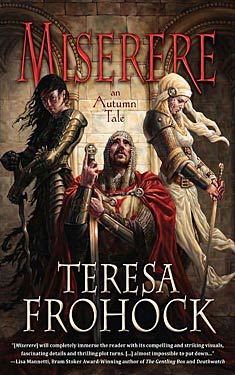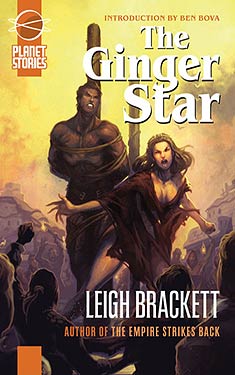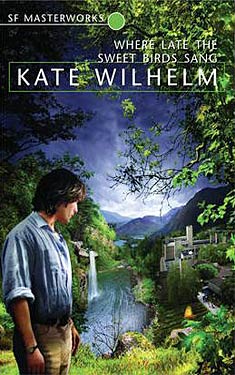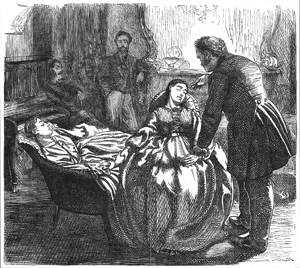WoGF Review: The Best of All Possible Worlds by Karen Lord
 Steven M. Long (Stevenmlong) is a writer and editor who blogs about the literary world of speculative fiction at stevenmlong.com and the rest of it (superheroes, aliens, online gaming and general silliness) at foesofreality.com. Blogging allows him to pretend that reading books and magazines and surfing speculative fiction sites constitutes “work.”
Steven M. Long (Stevenmlong) is a writer and editor who blogs about the literary world of speculative fiction at stevenmlong.com and the rest of it (superheroes, aliens, online gaming and general silliness) at foesofreality.com. Blogging allows him to pretend that reading books and magazines and surfing speculative fiction sites constitutes “work.”
 When I sat down to write this review I stumbled a little over how to categorize The Best of All Possible Worlds. Speculative fiction… yes… but it’s also a road novel, a sociological study, and (this came as something of a surprise) quite a good romance. The title of course made me think of Candide, and though I’d only go so far in drawing parallels it was hard not to see the novel in terms of the growth and choices of its lead character.
When I sat down to write this review I stumbled a little over how to categorize The Best of All Possible Worlds. Speculative fiction… yes… but it’s also a road novel, a sociological study, and (this came as something of a surprise) quite a good romance. The title of course made me think of Candide, and though I’d only go so far in drawing parallels it was hard not to see the novel in terms of the growth and choices of its lead character.
The primary narrative is that of Grace Delarua, a minor bureaucrat on the planet of Cygnus Beta, which serves as a gathering point for a myriad of cultures, a “galactic hinterland for pioneers and refugees.” To this world comes Dllenahkh, a Sadiri, whose planet has been destroyed and whose people are trying to find a new home and a way to preserve their culture. Together, along with a team sanctioned by both the government of Cygnus Beta and the Sadiri, they go on a year-long expedition to locate remnants of the Sadiri culture and people that have over time settled on Cygnus Beta, in hopes of finding enough cultural and genetic (there are more Sadiri men than women) elements to preserve the Sadiri race and and way of life.
WoGF Review: Miserere: An Autumn Tale by Teresa Frohock
 For Lynn Williams (lynnsbooks) books are much more than a hobby or a pastime they’re really an obsession. If she’s not reading a book, she’s talking about books on her blog, Lynn’s Book Blog, or deciding which books to buy next. Lynn reads all sorts of books, sometimes straying into YA, but her first love is fantasy. Recently she started to cross into science fiction thanks to the suggestions of some very excellent bloggers.
For Lynn Williams (lynnsbooks) books are much more than a hobby or a pastime they’re really an obsession. If she’s not reading a book, she’s talking about books on her blog, Lynn’s Book Blog, or deciding which books to buy next. Lynn reads all sorts of books, sometimes straying into YA, but her first love is fantasy. Recently she started to cross into science fiction thanks to the suggestions of some very excellent bloggers.
 Wow, Teresa Frohock‘s debut novel Miserere is an excellent read. I loved it and was torn between racing to the end to find out what was going to happen next and wanting to savour each word. I love a book that just takes my attention from the first chapter and holds it throughout and, more than that, when the last page is complete makes me want to go back and start again from the first page.
Wow, Teresa Frohock‘s debut novel Miserere is an excellent read. I loved it and was torn between racing to the end to find out what was going to happen next and wanting to savour each word. I love a book that just takes my attention from the first chapter and holds it throughout and, more than that, when the last page is complete makes me want to go back and start again from the first page.
There’s a lot going on here with new concepts and a unique world and yet the way the story unfolds is both simple and compelling. Don’t be mistaken by that though. This is an adult fantasy without a doubt. It’s dark and sinister, filled with political intrigue, battles between good and evil, torture, love, betrayal and more than that the search for redemption. I don’t know how TF manages to fit such a lot in to be honest!
Miserere brings us Heaven and Hell but with the extra plain of Worlde which acts as a buffer between the realms of Earth and Hell. Worlde is a plain where warriors, both male and female, battle against evil to prevent the demons from Hell taking over. It all sounds very religious when written down like that but, whilst the story does rely on a lot of symbolism, this isn’t a religious novel or at all preachy and indeed doesn’t particularly focus on any one creed but more looks at faith and hope and trust in the divine. With that in mind we have the age old concept of good against evil where the dark and twisted join forces with the corrupt in order to further their quest for domination and it all makes for an amazing story laced with horror and creepiness.
The Old Weird: Occult Detectives 1: The Notting Hill Mystery and The Dead Letter
Rhonda Knight is a frequent contributor to WWEnd through her many reviews and her excellent blog series Automata 101 and Outside the Norm. Ronda is an Associate Professor of English at Coker College in Hartsville, SC. She teaches Medieval and Renaissance literature as well as composition courses.
Each of these books is attributed to a pseudonym, but that is not all they have a lot in common. The Notting Hill Mystery by Charles Felix (probably the pseudonym of Charles Warren Adams) and The Dead Letter by Seeley Regester (the pseudonym of Metta Victoria Fuller Victor) also feature occult detectives. In addition, each book is purported to be the first detective novel written in England and America, respectively. Of course, Edgar Allen Poe is the progenitor of the mystery story, creating detective C. Auguste Dupin in 1841, and Wilkie Collins is considered the creator of the mystery novel, publishing The Woman in White in 1860, but it does not feature a detective as such. Collin’s later novel The Moonstone (1868) contains a good example of the first amateur detective. Charles Felix’s The Notting Hill Mystery,serialized from Nov. 29, 1862 to Jan. 17, 1863 in Once a Week, was published as a novel in 1863. In 2010, Paul Collins wrote an article about The Notting Hill Mystery for the New York Times revealing that Charles Felix was the pen name of the lawyer Adams and that this serial detective novel predates Wilkie Collins’ The Moonstone by five years. In America, Anna Katharine Green’s The Levenworth Case (1878) is usually named the first American detective novel, but The Dead Letter, serialized in Beadle’s Magazine from Jan. to Sept. 1866 and published as a novel the following year, predates it by several years. I will leave it to other critics to debate which novel is the first in its genre. What is important to me is these novels are early cases that combine detective fiction and the weird. Each focuses on paranormal mental capabilities. Mesmerism plays a large role in The Notting Hill Mystery, and one character’s psychic abilities aid the detective in The Dead Letter.
Women of Genre Fiction Reading Challenge: February Review Poll and Stats
 After 2 months the Women of Genre Fiction Reaching Challenge is starting to pick up steam! We featured 19 reviews in the blog last month including a big rush right there at the end. I’ve learned that if I get behind on posting these as they come in I’m going to be screwed in the last week so I’m going to be more vigilant in future.
After 2 months the Women of Genre Fiction Reaching Challenge is starting to pick up steam! We featured 19 reviews in the blog last month including a big rush right there at the end. I’ve learned that if I get behind on posting these as they come in I’m going to be screwed in the last week so I’m going to be more vigilant in future.
You’ve certainly made the voting difficult for yourselves this time. So many great reviews and its very nice to see some new reviewers in the mix.
- Tender Morsels by Margo Lanagan – Nadine Gemeinböck (Linguana)
- The Killing Moon by N. K. Jemesin – Nathan Barnhart (Skynjay)
- Among Others by Jo Walton – Alex Hammel (ahammel)
- Feast of Souls by C. S. Friedman – Lynn Williams (lynnsbooks)
- Centuries Ago and Very Fast by Rebecca Ore – Charles Dee Mitchell (charlesdee)
- Zoo City by Lauren Beukes – Scott Lazerus (Scott Laz)
- The Antelope Wife by Louise Erdrich – Star Hall (Stella Atrium)
- Witch World by Andre Norton – Sue Bricknell (SueCCCP)
- To Say Nothing of the Dog by Connie Willis – Jack Dowden (Jdowds)
- Zoo City by Lauren Beukes – Matt W. (Mattastrophic)
- Assassin’s Apprentice by Robin Hobb – Allie McCarn (Allie)
- Among Others by Jo Walton – Barry F. (bazhsw)
- Songs of the Earth by Elspeth Cooper – Barbara Evers (Bevers)
- The Sparrow by Mary Doria Russell – Thom Denholm (Thomcat)
- The Mad Scientist’s Daughter by Cassandra Rose Clarke – Carl V. Anderson (Carl V.)
- The Whitefire Crossing by Courtney Schafer – Carrie Naughton (Bookkeeper)
- Range of Ghosts by Elizabeth Bear – Emily Sandoval (ersandoval)
- Where Late the Sweet Birds Sang by Kate Wilhelm – Stephanie (Rhetori_Cat)
- The Ginger Star by Leigh Brackett – Rhonda Knight (Rhondak101)
The poll is open now so be sure to vote for your favorites in the forum and remember, there are three prizes up for grabs each month. The poll will be open until March 20th to give everyone extra time to read all the reviews and cast their votes. Good luck to all our reviewers!
And lastly, The Amazing Rhonda Knight™ has the stats for us again this month:
General Stats for 2 Months
- Participants: 193
- Books Read: 247
- Books Reviewed: 139
Genre
- General Fantasy – 71
- Contemporary Fantasy – 38
- Soft SF – 32
- Alt. History/Time Travel – 24
- Horror – 14
- Hard SF – 14
- Steampunk – 10
- Urban Fantasy – 10
- Military SF – 8
- Pulp/Space Opera – 6
- Cyberpunk – 6
- Other – 6
Authors
- Connie Willis – 10
- Kage Baker – 7
- Jo Walton – 7
- Lauren Beukes – 6
- Anne McCaffery – 5
- Seanan McGuire – 5
- Andre Norton – 5
- Catherynne M. Valente – 5
Books
- Jo Walton – Among Others – 7
- Kate Wilhelm – Where Late the Sweet Birds Sang – 6
- Kage Baker – The Garden of Iden – 5
- Lauren Beukes – Zoo City – 6
- Connie Willis – Doomsday Book – 5
Game of Thrones Season 3 Extended Trailer
This extended trailer for Game of Thrones looks pretty wicked! The dragon effects look better than the little bit we saw last season. Can’t wait!
WoGF Review: The Ginger Star by Leigh Brackett
 Rhonda Knight is a frequent contributor to WWEnd through her many reviews and her excellent blog series Automata 101 and Outside the Norm. Ronda is an Associate Professor of English at Coker College in Hartsville, SC. She teaches Medieval and Renaissance literature as well as composition courses.
Rhonda Knight is a frequent contributor to WWEnd through her many reviews and her excellent blog series Automata 101 and Outside the Norm. Ronda is an Associate Professor of English at Coker College in Hartsville, SC. She teaches Medieval and Renaissance literature as well as composition courses.
 One of the intended or unintended consequences of the WoGF page is that viewers are faced with rows upon rows of authors’ faces, which they don’t always recognize. Often when I see the face of an author that another participant has chosen, I think “What an interesting face? Who is she?” This is the way that I chose my “random read.” As I was trolling along, I saw the face of Leigh Brackett (1915-1978) and thought “She looks interesting.” I was not wrong. The link to her WWE bio hinted that Brackett was a significant foremother for many of the other women whose faces look out at us from the WoGF page.
One of the intended or unintended consequences of the WoGF page is that viewers are faced with rows upon rows of authors’ faces, which they don’t always recognize. Often when I see the face of an author that another participant has chosen, I think “What an interesting face? Who is she?” This is the way that I chose my “random read.” As I was trolling along, I saw the face of Leigh Brackett (1915-1978) and thought “She looks interesting.” I was not wrong. The link to her WWE bio hinted that Brackett was a significant foremother for many of the other women whose faces look out at us from the WoGF page.
While I don’t want to turn this into a biography rather than a review of The Ginger Star, I would like to discuss a little of what I learned about Leigh Brackett that makes me award her foremother status. Early in her career, Brackett wrote both science fiction and detective stories for such pulps as Astounding Science Fiction, Thrilling Detective and New Detective. Her first novel was a hard-boiled detective tale, No Good from a Corpse, which has been hailed by critic Bill Pronzini as more like Raymond Chandler’s writing than Chandler’s own. (I have since read this novel and agree that it is a great example of the hard-boiled detective.) This novel served as Brackett’s entrance into Hollywood and scriptwriting. The story goes like this: After reading No Good from a Corpse, the legendary director Howard Hawks said “this guy Brackett–he’d be good to write the screenplay of The Big Sleep with Bill Faulkner.” Although Hawks was surprised that a woman appeared in response to his offer, he hired her and began a long professional relationship with her. She was a screenwriter for many other Hawks directed films, including the John Wayne vehicles, Rio Bravo (1959), Hatari! (1962), El Dorado, (1966), and Rio Lobo (1970). In addition, she wrote the satiric screenplay based on Chandler’s novel The Long Goodbye (1973), directed by Robert Altman. She had completed a first draft of The Empire Strikes Back for George Lucas just before she died, and he dedicated the movie to her posthumously. Her version of the movie is here.
WoGF Review: Where Late the Sweet Birds Sang by Kate Wilhelm
 Stephanie (Rhetori_Cat), became a fan of science fiction and fantasy when she convinced her dad to hand over his copy of Ender’s Game by creepily reading over his shoulder until he couldn’t stand it anymore. Since then, she’s turned her love into a research interest as she works on her PhD in Rhetoric and Composition (don’t worry, nobody knows what that means). Her blog, Speculative Rhetoric, focuses on the relationships between speculative fiction and theories of gender, language, communication, and rhetoric.
Stephanie (Rhetori_Cat), became a fan of science fiction and fantasy when she convinced her dad to hand over his copy of Ender’s Game by creepily reading over his shoulder until he couldn’t stand it anymore. Since then, she’s turned her love into a research interest as she works on her PhD in Rhetoric and Composition (don’t worry, nobody knows what that means). Her blog, Speculative Rhetoric, focuses on the relationships between speculative fiction and theories of gender, language, communication, and rhetoric.
 The blurb on the cover of my copy of Kate Wilhelm‘s 1976 novel Where Late the Sweet Birds Sang claims that it is the best novel about cloning ever. I was skeptical at first, but by the end of the novel I was pretty convinced that Wilhelm was doing something unique with the issue of cloning, engaging with the ethical issues from a different direction. At the same time, I’m still struggling with how to understand the final message of the text, whether Wilhelm wants us to celebrate the “individual” or understand that the “individual” is constructed out of a particular set of circumstances.
The blurb on the cover of my copy of Kate Wilhelm‘s 1976 novel Where Late the Sweet Birds Sang claims that it is the best novel about cloning ever. I was skeptical at first, but by the end of the novel I was pretty convinced that Wilhelm was doing something unique with the issue of cloning, engaging with the ethical issues from a different direction. At the same time, I’m still struggling with how to understand the final message of the text, whether Wilhelm wants us to celebrate the “individual” or understand that the “individual” is constructed out of a particular set of circumstances.
The Plot: David and his family begin reading the signs of the coming apocalypse with enough time to prepare an elaborate medical facility and living space for many people, including farmland and livestock. It quickly becomes apparent that the spreading plague and chemical fallout is making many of the inhabitants of the compound, both human and animal, sterile, and David and his fellow biologists design a plan for maintaining the human race via cloning. However, as the clones grow and develop, it becomes increasingly clear that they are incredibly alien from their human elders; rather than distinguishing themselves as individuals, clones understand the cloned siblings collectively to constitute a unit, and the mental development, including telepathy, reflects this. As the human elders die off, the clones set up a new society, but when the clones send off an exploratory party made up of individuals from different sibling sets, the traits of individuality begin to reappear, eventually resulting in the casting out of one woman and her further imprisonment upon becoming pregnant. Her son, Mark, is the protagonist on the last third of the novel, as the clones begin to exhibit signs of depletion in creative thinking and problem-solving skills and Mark begins his own plans to save the human race.



















 Full Details
Full Details


